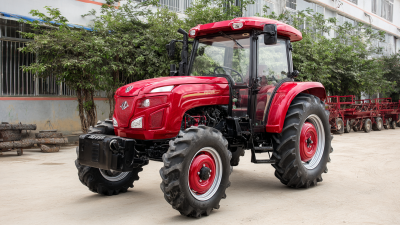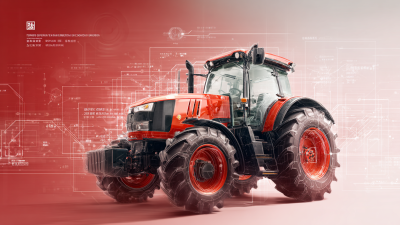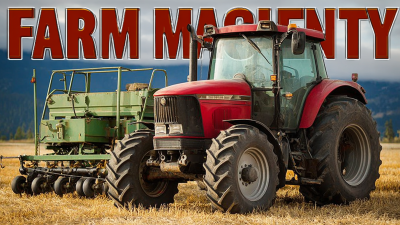As the agriculture industry continues to evolve, the adoption of innovative tools and machinery is paramount for boosting efficiency and productivity. One such innovation is the mini tractor, a versatile machine designed for a variety of tasks while being compact enough to navigate smaller plots of land. According to a report by Grand View Research, the global mini tractor market was valued at approximately $4 billion in 2021 and is projected to grow significantly, driven by the rising demand for efficient farming practices. These machines not only reduce labor costs but also enhance operational efficiency, allowing farmers to cultivate more land with less physical strain. In this comprehensive guide, we will delve into the multifaceted benefits of mastering mini tractors, helping agricultural professionals harness their potential to optimize productivity and streamline operations.

When it comes to choosing the right mini tractor for your farming needs, several key features and considerations can significantly boost your agricultural efficiency. First and foremost, evaluate the horsepower and torque options available. Mini tractors typically range from 20 to 50 HP, making them suitable for various tasks, from tilling to hauling. Selecting the right power for your specific farming requirements ensures that you can handle different tasks effectively while maximizing productivity.
Another important aspect to consider is the type of transmission system. Mini tractors may come with manual, automatic, or hydrostatic transmissions, each offering different advantages. Hydrostatic systems, for instance, provide smoother operation and easier maneuverability, especially in tight spaces. Always assess your comfort with different transmission types, as it can influence your overall experience when operating the tractor.
Tip: Always check the availability of spare parts and service support for the tractor brand you're considering. This ensures that you can maintain your equipment efficiently and avoid long downtimes. Additionally, look into the warranty and after-sales support offered by the manufacturer to safeguard your investment for the long haul.
| Feature | Description | Importance |
|---|---|---|
| Engine Power | Measured in horsepower, it indicates the tractor's capability to perform various tasks. | Critical for efficiency in heavy-duty tasks. |
| Transmission Type | Options include manual, automatic, or hydrostatic, influencing ease of use and control. | Affects operator comfort and operational efficiency. |
| Weight | The overall mass of the tractor affects stability and traction. | Essential for maintaining balance during operations. |
| Fuel Type | Options include diesel, gasoline, or electric, impacting operational costs. | Critical for budget management and sustainability. |
| Hydraulic Lift Capacity | The maximum weight the hydraulic system can lift, measured in pounds. | Influences the range of attachments and implements that can be used. |
| Maneuverability | The ability to navigate tight spaces effectively. | Important for operations in limited spaces. |
When it comes to enhancing agricultural efficiency, choosing the right mini tractor can significantly impact productivity on your farm. According to the 2022 Agricultural Machinery Market Report, mini tractors, which typically range from 20 to 50 horsepower, are gaining traction among small-scale and mid-sized farmers seeking to optimize their operations. These compact machines offer versatility, making them ideal for a variety of tasks like plowing, tilling, and hauling.
Among the top brands in the mini tractor market, John Deere, Kubota, Mahindra, New Holland, and Massey Ferguson stand out for their reliability and performance. For instance, John Deere's 1 Series tractors are known for their user-friendly design and efficient fuel consumption, while Kubota's L Series provides exceptional lift capacity and attachments flexibility. Mahindra is often recognized for its competitive pricing and robust build quality, making it an attractive option for budget-conscious farmers.
Tips for selecting the ideal mini tractor include assessing the specific needs of your farm operations and considering the availability of parts and service. Additionally, evaluate the comfort and ease of operation to ensure long-term satisfaction. Exploring financing options can also help make these powerful machines more accessible, ultimately enabling you to elevate your agricultural efficiency.
When it comes to enhancing the productivity of your mini tractor, selecting the right attachments can make all the difference. These versatile machines can be equipped with various tools designed to optimize efficiency across numerous agricultural tasks. From plowing and tilling to hauling and landscaping, the right attachments can transform your mini tractor into a powerhouse for small-scale farming operations.
One essential attachment is the rotary tiller, which is perfect for aerating soil and preparing seedbeds. This tool ensures that your soil structure remains healthy, promoting better crop yields. Additionally, a front-loader bucket can significantly enhance your mini tractor's capabilities by allowing you to easily move materials such as soil, gravel, or debris. For more specialized tasks, consider a post-hole digger, which can simplify the process of fence installation or planting trees. Investing in quality attachments tailored to your specific needs will enable you to get the most out of your mini tractor, ultimately boosting your agricultural efficiency.

 Maintaining your mini tractor in peak condition is essential for maximizing agricultural efficiency. Regular maintenance not only enhances performance but also extends the lifespan of your equipment. Start by paying attention to the engine oil; change it according to the manufacturer's recommendations to ensure optimal lubrication. Additionally, regularly inspecting the air filter is crucial. A clean air filter improves engine efficiency and performance, so replace it when it becomes dirty or clogged.
Maintaining your mini tractor in peak condition is essential for maximizing agricultural efficiency. Regular maintenance not only enhances performance but also extends the lifespan of your equipment. Start by paying attention to the engine oil; change it according to the manufacturer's recommendations to ensure optimal lubrication. Additionally, regularly inspecting the air filter is crucial. A clean air filter improves engine efficiency and performance, so replace it when it becomes dirty or clogged.
Moreover, don’t overlook the importance of the battery and electrical system. Check the battery terminals for corrosion and keep them clean to ensure a reliable start every time. It's also a good idea to inspect the tires for proper inflation and tread wear, as this affects traction and overall safety on the farm. Lastly, storing your mini tractor in a dry, sheltered location can prevent rust and damage from the elements, ensuring that when you're ready to work, your mini tractor is ready to perform at its best.
Mini tractors have revolutionized small-scale farming, providing versatile solutions that enhance efficiency and productivity. These compact powerhouses can be utilized in various innovative ways, making them indispensable tools for farmers with smaller plots. One of the most effective uses of mini tractors is in soil preparation. Their size allows them to maneuver easily in tighter spaces, making tasks like tilling, plowing, and cultivating not only easier but also more effective. This means improved soil aeration and better seed bed preparation, leading to healthier crops.
Additionally, mini tractors excel in maintenance tasks, such as mowing and weed control. Equipped with attachments like rotary mowers or cultivators, they can tackle overgrown fields and ensure that crops remain free from competition. This adaptability extends to transporting goods around the farm. With the ability to attach small trailers, mini tractors can efficiently move produce, equipment, and materials, streamlining operations and saving valuable time. By incorporating mini tractors into their daily routines, small-scale farmers can significantly boost their agricultural efficiency while reducing labor costs and increasing overall productivity.





